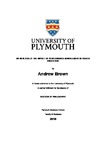AN ANALYSIS OF THE IMPACT OF PERFORMANCE MANAGEMENT IN HIGHER EDUCATION
| dc.contributor.supervisor | Saundry, Richard | |
| dc.contributor.author | Brown, Andrew | |
| dc.contributor.other | Plymouth Business School | en_US |
| dc.date.accessioned | 2019-06-19T15:01:08Z | |
| dc.date.issued | 2019 | |
| dc.identifier | 10264067 | en_US |
| dc.identifier.uri | http://hdl.handle.net/10026.1/14332 | |
| dc.description.abstract |
Recent changes in higher education sector have resulted in an increasingly marketised and competitive environment. Fee changes have heightened student expectations, whilst neo-liberal approaches, such as the removal of the student number cap have intensified focus on the recruitment and retention of students. Consequently performance in a variety of league tables has become a primary area of concern for universities, both as a means of student attraction and also as a response to pressure from a range of stakeholders. It is against this backdrop, that this research considers the impact of performance management within the sector. It is through such mechanisms that institutions attempt to leverage improved efficiency, raise performance standards, and evidence achievement against a variety of benchmarks. Despite the more taxonomical environment within higher education, the issue of performance management remains under researched. The aim of this research is therefore to illuminate the challenges and complexities faced by the three institutions in addressing and managing academic performance. Taking a case-study approach, the research rests on a conceptual framework that highlights the prominence of power, status, authority and ambiguity. The thesis argues that these concepts are undervalued within existing performance management debates, and contributes to the knowledge base within this area, The research makes a number of key recommendations for policy and practice. It calls for greater recognition of the role of status within performance discussions, highlighting the potential for this to obfuscate performance management discussions. It challenges assumptions around the authority of line managers, and the extent to which this leads to managerial reluctance, and argues that existing literature has not adequately addressed issues of nuanced managerial responsibility within flatter organisational structures. It also challenges the view that academics lament the notion of performance management and provides evidence that many academics want an increased focus on performance as a means of achieving a greater sense of fairness and parity within their working environment. | en_US |
| dc.description.sponsorship | Plymouth University | en_US |
| dc.language.iso | en | |
| dc.publisher | University of Plymouth | |
| dc.subject | Performance Management | en_US |
| dc.subject | Line Manager | |
| dc.subject | Devolution | |
| dc.subject.classification | PhD | en_US |
| dc.title | AN ANALYSIS OF THE IMPACT OF PERFORMANCE MANAGEMENT IN HIGHER EDUCATION | en_US |
| dc.type | Thesis | |
| plymouth.version | publishable | en_US |
| dc.identifier.doi | http://dx.doi.org/10.24382/557 | |
| dc.identifier.doi | http://dx.doi.org/10.24382/557 | |
| dc.rights.embargodate | 2020-06-19T15:01:08Z | |
| dc.rights.embargoperiod | 12 months | en_US |
| dc.type.qualification | Doctorate | en_US |
| rioxxterms.version | NA |
Files in this item
This item appears in the following Collection(s)
-
01 Research Theses Main Collection
Research Theses Main


